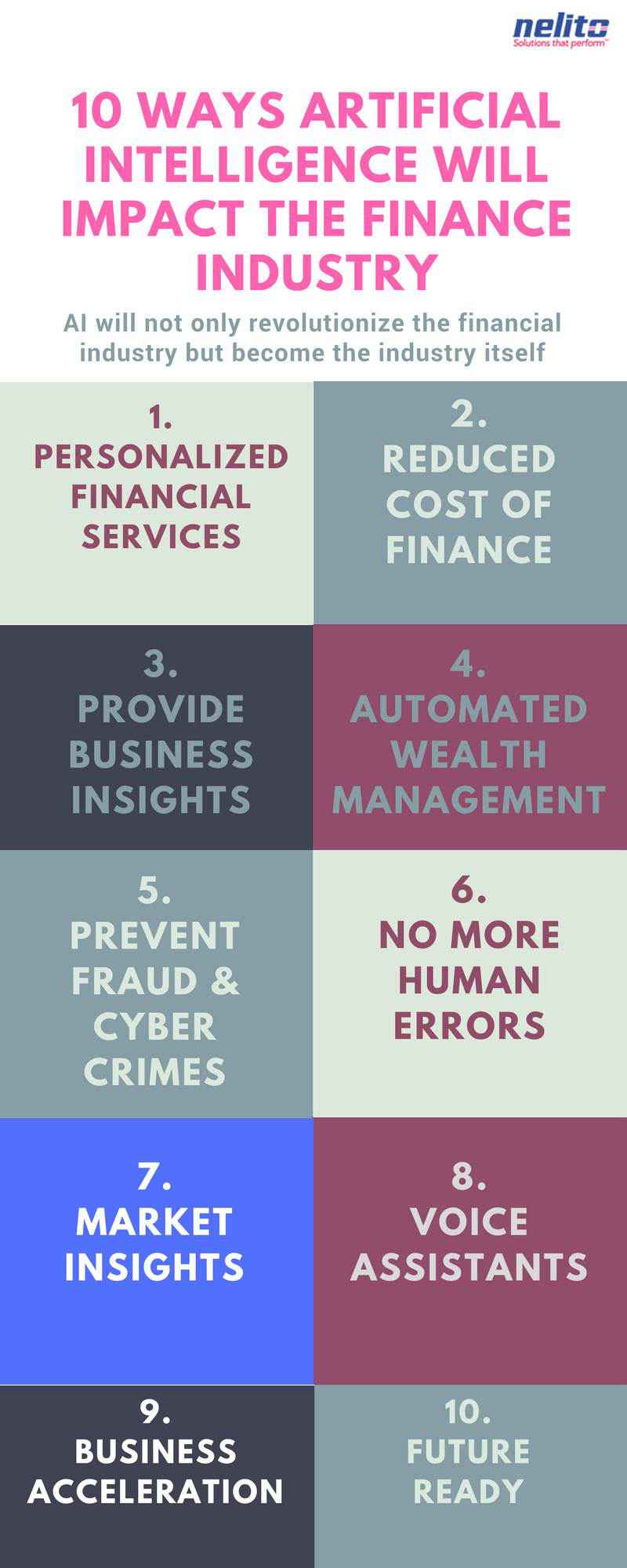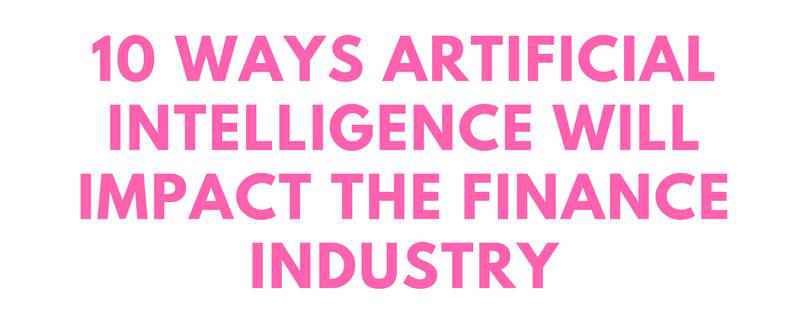AI and its impact on the finance industry
Updated On : December 2017
There is no other business sector that is more focused on developing and implementing AI for speed, accuracy, and efficiency as much as the financial industry. At the heart of the AI revolution are machine learning algorithms, software that self-improves as it is fed more and more data, a trend that the financial industry can benefit from immensely. AI in finance is creating a huge impact. Let's take a look how.
Personalized financial services
AI expands the gamut of financial services by means of what are called as consumer financial services. Consumer financial services keep the consumers and their unique demands at the core of their highly optimized offerings. AI makes it possible to provide consumers with a personal financial concierge that automatically lets them decide a suitable style of spending, saving, and investing that are based on their personal habits and goals. With AI in finance, it's possible to create intelligent products that can learn from the customer's financial data and determine what's working for them and what's not, and help them track their financial activities better.
The reduced cost of AI in finance
This is something we all must have experienced and would, therefore, agree with. AI in finance has automated processes and drastically reduced the cost of serving customers. While AI has, on one hand, reduced the cost of financial services, on the other, it has made financing extremely convenient to avail. Through various digital servicing channels, AI is proving effective in attracting that large section of the population to financial services, which previously found them cumbersome, expensive, and time-consuming.
Newer management styles
AI in finance is opening up new avenues for banking and insurance leaders to seek advice. No more are financial experts limited to human opinions in order to make forecasts or recommendations in the field of finance. With AI in finance, these leaders can now ask machines questions that are pertinent to their business and these machines can, in turn, analyze data and help them take data-driven management decisions.
Wealth Management for clients
One of the banking areas that have seen a considerable investment in AI is wealth management. Both incumbents and newcomers are realizing that the digital shift happening in the banking space would affect this sector. Industry heavyweights are acquiring tech start-ups with special focus on automatic analysis of large amounts of unstructured data. The purpose is to detect "typical" behavioral patterns. These experts are hoping to build AI engines, which can provide insights on how to best service their high-net-worth clients. By automating large parts of the wealth management process, they would be able to offer personalized, tax-optimized investments to clients, who have far less in investable assets than what would usually qualify for professional wealth management.
Pre-empted fraud scenarios
With AI, it is possible to simulate umpteen situations where a fraud or cyber crime may occur. AI in finance, therefore, follows a proactive approach to making the financial services' environment safe and breach-proof. Unlike before, designers of a financial service system do not need to wait for an incidence of fraud to be detected and then secure a system. AI is helping the field of finance innovate freely by securing its products and services through a continuous understanding of human psychology. Besides, AI in finance also helps keep a strict regulatory oversight. AI ensures that all policies, regulations, and security measures are being sincerely followed while designing and delivering any financial service.
Automation
Critical decisions in fields like finance cannot afford to be marred by the inaccuracy involved in human decisions. AI in finance implies thorough research, understanding, and learning over long periods of time and vast volumes of data. AI introduces automation in areas that require high degrees of incisiveness thereby, safeguarding the trust of consumers.
Insight generation
Insight generation involves extracting meaningful and actionable intelligence from ever-increasing quantities of available raw data.With the amount of information in the world nearly doubling each year, it is no surprise that data complexity is the top challenge standing in the way of digital transformation. One of the fastest growing uses of AI is to listen to all customer communications, both directly with a company and about that company in the market at large - ranging from call centre conversations to chat sessions and even social media activity.
Voice Assisted Banking
This technology empowers customers to use banking services with voice commands rather than a touch screen. The natural language technology can process queries to answer questions, find information, and connect users with various banking services. Barclays is currently developing a technology that will enable users to carry out money transfers by talking to a robot computer system. The AI system will be similar to Apple's iPhone personal assistant, Siri.
Business acceleration
Business acceleration refers to how companies use AI to expedite knowledge-based activities to improve efficiency and performance, such as financial institutions creating investment strategies for their investors. While this type of activity is often viewed as an opportunity to reduce costs through the automation of internal processes, it should also be considered in terms of the firm's ability to transform the customer experience.
For example, if a bank can use AI to minimise the time it takes to approve a loan, it not only reduces its own costs but also provides an improved customer experience.
The future
AI in finance is all about continuous learning and re-learning of patterns, data, and developments in the financial world. AI gives the flexibility to build upon the current system or line of financial products and services. This means there is no need to start from scratch, but can easily keep improvising the offerings over time. Once introduced, AI will keep the financial services updated and ready to face the market. AI in finance is, therefore, invaluably contributing to the financial industry. Over time, AI is not only going to revolutionize the financial industry but become the industry itself.




Comments :